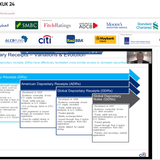Argentine officials have planned a roadshow to test investor appetite for the sovereign’s planned US$12.5bn worth of bond issuances that will mark the country’s return to the international debt capital markets.
The lead underwriters on the deal include HSBC, JP Morgan, Deutsche Bank and Santander. The bookrunners are BBVA, UBS and Citigroup.
The sovereign will use the proceeds from the issuance to pay its holdout creditors. It would then have to issue further debt to bolster its economy.
Morgan Stanley predicts that Argentina will need to raise up to US$20bn from the international capital markets this year alone.
But the size of the country’s planned debut issuance means the country risks saturating the region’s markets, and there are concerns that the sovereign will struggle to find sufficient appetite for its debt amongst the traditional emerging market investor base.
There have also been questions over the size of the yields proposed by Argentina; it is expected that the sovereign will have to offer concessions to sell over US$12bn of bonds.
The country has suggested that its 10-year notes could come with a yield of 7.5%, however many emerging market investors are unlikely to accept anything under 8%, with some saying 8.5% would be reasonable for a 10-year bond in the current economic climate. A 7.5% yield has however been considered reasonable for 3-year notes.
Despite these concerns, traditionally, yields from Argentine debt have rarely fallen out of line with market expectations.
“The recent bond from the Province of Buenos Aires priced within initial price thoughts, which was in line with what the market was expecting,” said Dylan Parker, a trader at Torino Capital, adding that 8% to 8.5% was likely.
Large sub-sovereign debt issuances by Argentina’s provincial governments are also expected to follow the federal government’s move, which could further saturate the market with Argentine debt.
“People will step up to invest in the country’s bonds, but how much appetite there will be for the large amounts of debt comes down to timing,” Parker said.
He noted that the timing would be particularly important between the provinces and the sovereign if a saturation of the market was to be avoided. A saturation of the markets would cause prices to fall, which would reduce the cost of sovereign bonds and see their yields increase.
Yields on the country’s benchmark 2033 bonds have fallen as prices have risen 3.6% since the beginning of 2016.









